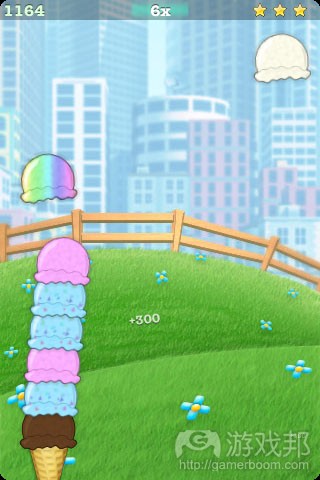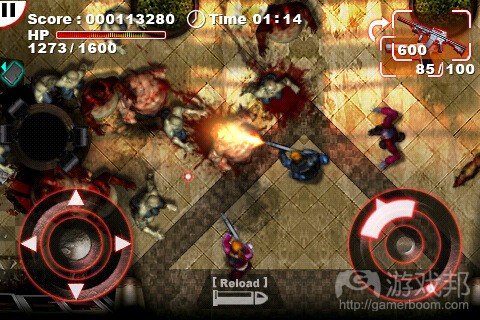手机游戏设计需解决来电打断进程的问题
作者:Steve Bromley
iPhone游戏的平台是手机,这个最显而易见的特征往往被开发者所忽视。大意可能导致多种后果,比如给玩家在某些地点玩游戏带来不便。今天我们要关注的重要因素是手机来电问题。
如果手机在接收到文本短信时会自动浮现可关闭的弹窗提醒,使其对玩家游戏的干扰达到最小。这是iPhone操作系统自带的功能,无需开发者耗费精力。但是,手机在来电时会立即关闭游戏应用并运行电话程序,无论用户是否愿意接听这个电话。这时,精巧的设计就可以避开此类令人不悦的事情。
从技术层面上说,来电本质上与现有按动“主界面”(游戏邦注:iPhone上唯一的按键)的进程相同。但是从可用性的角度来看,二者的差异在于用户是否主观决定转向接听界面,这个问题需要通过软件设计来解决。如果应用在退出时未保存游戏进度,用户在结束通话或拒绝来电后开启应用需要重玩游戏进程,这会对用户体验产生消极影响。他们很可能就不想再玩游戏了,仅仅因为游戏让用户重玩他们之前已经完成的进程。而且,接听电话便会失去进度这种恐惧感会一直存在,阻止用户继续在该应用上投入更多时间。
因而,iPhone游戏设计师应当考虑到手机平台可能会突然打断游戏进程,为此问题提供恰当的解决方案。
成功解决该问题的游戏
休闲冰淇淋堆叠游戏《Scoops》在更新版本中成功解决了这个问题。在最初发布的版本中,来电(游戏邦注:以及其他使游戏中断的操作)会导致整个游戏从头开始,而且游戏不会保存最高分。虽然整个游戏进程持续时间不是很长(游戏邦注:每局通常不足10分钟),但衡量游戏进程的唯一方式就是高分,因而诸如此类的进程丧失极容易惹恼玩家。开发商意识到这个问题,在后续更新版本中予以纠正。现在接听电话后,游戏进程会回到离开的那一刻。而且,玩家处理来电后重返游戏时进程处于暂停状态,这样用户便可以做足重新开始游戏的准备。设计师Ian Marsh的做法确保打断游戏过程的操作不会影响到玩家的进程。
未解决该问题的游戏
灵感来源于《生存之旅》的僵尸生存游戏《Alive4ever》近期添加了“生存”模式,用户努力在一波波难度逐渐增加的僵尸攻击下存活以获得额外奖励。《Alive4ever》其他模式每个关卡的持续时间不到5分钟,但新模式要求玩家毫不间断地玩1个多小时才能解锁所有武器。如果用户离开游戏或有来电,那么此模式下的进程将丢失,用户只得从头开始。用户很可能就不愿意再次尝试,真正的挑战不再是屏幕上的僵尸,而是在1个小时多的时间里保证没有任何来电干扰。
游戏邦注:本文发稿于2009年10月12日,所涉时间、事件和数据均以此为准。(本文为游戏邦/gamerboom.com编译,如需转载请联系:游戏邦)
iPhone games should not be interrupted by calls
Steve Bromley
The most obvious thing that can be said about iPhone gaming, and yet a factor developers commonly miss, is that it appears on a phone. There are many ramifications from this, such as where a player is likely to be playing (the bathroom?). The focus today though is on the important factor that a phone is likely to receive calls.
Text messages are handled by the iPhone OS, and appear as a pop up box that can be dismissed, with minimal interruption of the game (and hence needs no input from a developer). However receiving a call will shut down the game and run the phone program regardless whether the call is answered. This is where good design is required to avoid a usability disaster.
From a technical perspective receiving a call is essentially the same exit process as if the ‘home’ button (the only button on the main page) is pressed. However from a usability perspective, the important difference is that the user has no control over whether they receive calls or not, and so the software has to accommodate this. If the app just ‘drops’ you, without saving the state of play, and then starts the app from fresh when the call is finished/rejected, this is going to negatively effect the user’s experience. They will be unlikely to want to play again, since they will be redoing aspects of the game they thought had been completed earlier. Furthermore the fear that they will receive more calls, and thus lose progress, is going to be a lasting factor, and prevent the user from investing time to continue.
It is therefore important for iPhone game designers to consider that the medium is going to lead to unexpected interruptions to game play, and provide a solution which will accommodate this.
Who does this right?
Scoops, the casual ice cream tower building game, successfully implemented this in a later version of their game. In the initial release a call (or ending the game) would cause the game to restart from the beginning (without saving the high score). Despite being a short game (a typical session would probably be under ten minutes), the game’s only measure of progress is a high score table, and so losing progress like this can easily anger players. This was recognised, and fixed in later versions so that now the game will resume from where it left off after returning from a call. Further to this, the game will start paused so that players returning from a phone call can adequately prepare to resume their gaming session. The designer, Ian Marsh, has ensured that interruptions to game play will not hinder player’s progress in the game.
Who does this wrong?
Alive4ever, the zombie survival game ‘inspired’ by Left4Dead, has recently added a ‘horde’ mode, where users must survive waves of enemies of increasing difficulty in order to unlock additional bonuses. Unlike Alive4ever’s other modes, where games would be in <5 minute intervals, successfully unlocking all the weapons in the new mode would require playing for over an hour without interruption. If the user intentionally exits the game, or receives a call, their progress in this mode is lost, and the user has to start the hour long session from the beginning. The implications of this are that the user will be unlikely to retry this, and the real enemy becomes not the zombies on screen, but the challenge of not receiving calls for an hour! (Source: Steve Bromley\\’s UX Blog)










































 闽公网安备35020302001549号
闽公网安备35020302001549号